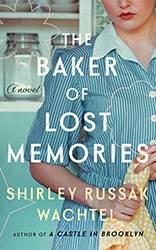The Story of the Forest by Linda Grant is not, as its name suggests, simply the story of the forest. Instead, it is a multigenerational exploration of how family stories can mutate through the years, and how that change affects those who tell it — as well as those who hear it.
Fourteen-year-old Mina’s chance meeting with Bolshevik revolutionaries in the Latvian forest in 1913 inadvertently kicks off a series of events that ultimately leads to her fleeing with her older brother to England. Mina’s story of the forest inspires her assimilated British daughter, Paula, to flirt with the performative socialism of the hypocritical upper classes, as well as to turn her mother’s memories into a movie, which depicts Mina’s experience as a kind of timeless fable.
“It never was like that,” Mina protests when she first sees her youthful exploits cast on screen. But the director counters, “No, maybe it wasn’t, but this way is better.”
The narrator recounts, “The tale, this piece of once-lived firsthand experience was [the director’s] now.” A fitting metaphor, perhaps, for what happens to all memories the moment they are shared with someone else.
By the time Mina’s grandchildren encounter her “firsthand experience,” their take is, “That whole world is kind of a fairy story, isn’t it?”
“Not to us who lived in it,” counters a relative who survived the USSR’s savagery. This relative explains that family stories served a different purpose for those left behind. “We had a story, and the story was ours. It didn’t belong to the People, but to us.”
Family stories can be a form of silent rebellion. The State might control its citizens’ actions, and can even try, through tortuous means, to control their thoughts. Holding onto one’s own memories, and to the memories of those who came before them, is often the only thing those living under brutal regimes can claim for themselves.
Stories don’t only illuminate the past; they also help shape the present. As Paula reminisces about her parents, “They were immigrants, no one knew them, they could say what they liked. When you’re uprooted like they were, you can be anything you want. Who’s going to say otherwise?”
Stories affect the future, too. Mina is mother to Paula who is mother to Shelley who is mother to Zoe, an “uninterrupted line of daughters, each less Jewish than the last.”
Mina’s descendants may drift further and further away from the Judaism her family practiced back in Latvia, but it is their family stories, when they choose to hold onto them, that keep them connected to who they once were — and offer a cautionary tale about what might have been.
Alina Adams is the NYT bestselling author of soap opera tie-ins, figure skating mysteries and romance novels. Her Regency romance, The Fictitious Marquis was named a first Jewish #OwnVoices Historical by The Romance Writers of America. Her Soviet-set historical fiction includes The Nesting Dolls, My Mother’s Secret: A Novel of the Jewish Autonomous Region, and the May 2025 Go On Pretending. More at: www.AlinaAdams.com.





